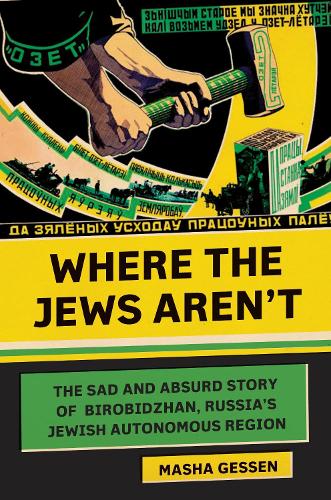
Where the Jews Aren't: The Sad and Absurd Story of Birobidzhan, Russia's Jewish Autonomous Region
(Hardback)
Publishing Details
Where the Jews Aren't: The Sad and Absurd Story of Birobidzhan, Russia's Jewish Autonomous Region
By (Author) Masha Gessen
Schocken Books
Schocken Books
15th September 2016
United States
Classifications
Physical Properties
Hardback
192
Width 183mm, Height 241mm, Spine 51mm
395g
Description
The previously untold story of the Jews in twentieth-century Russia that reveals the complex, strange, and heart-wrenching truth behind the familiar narrative that begins with pogroms and ends with emigration In 1929, the Soviet Union declared the area of Birobidzhan a homeland for Jews. It was championed by a group of intellectuals who envisioned a place of post-oppression Jewish culture, and by the early 1930s, tens of thousands of Jews had moved there from the shtetls. The state-building ended quickly, in the late 1930s, with arrests and purges of the Communist Party and cultural elite, but after the Second World War, the newly named "Jewish Autonomous Region" received an influx of Jews dispossessed from what had once been the Pale, most of whom had lost families in the Holocaust. In the late 1940s, another wave of arrests swept through Birobidzhan, traumatizing the Jews into silence, and effectively making them invisible. Now Masha Gessen gives us a haunting account of the dream of Birobidzhan-and how it became
Reviews
Gessen tells a poignant tale in Where the Jews Arent. The books most memorable sections are Gessens ruminations on homelessness as experienced by her own generation of Russian Jews, [which] helps her better appreciate the yearnings of the supporters of perhaps the worst good idea ever. Steven J. Zipperstein, The New York Times Book Review
Gessen has the subtlety, honesty and tragic sensibility necessary to take a period and a society that are dripping in cruel irony, and to tell her stories with great affect, without being treacly or preachy. Haaretz
Accessible.Gessen traces the grim story of Birobidzhan, a region in the desolate Soviet Far East where Jews were granted autonomy and an opportunity to escape their harsh existence of poverty, discrimination, terror, and non belonging in Soviet Russia. The hopes were never realized, however, and the venture turned out to be a tale of concentrated tragic absurdity.Gessen ably tells one of the 20th centurys most chilling stories of struggle, perseverance, and despair. Publishers Weekly
Moscow-bornGessen addresses the story of the Jewish struggle for autonomy in Stalins Russia. With no reason given, the Russian government decided that Jews, along with other ethnic groups like the Koreans, should be granted their freedom in an out-of-the-way spot along the Chinese border. Birobidzhan was one of the worlds two Jewish states, a place with a Yiddish language newspaper but no Yiddish-speaking residents. As the author tells of the formation of the settlement in 1934, she describes life as a Russian Jew. Even though she left when she was 12, Gessen ably explores the mindset of those before her who lived through the time.Though the narrative offers a depressing picture of Russian Jews, it is packed with wonderful stories of strength, intelligence, and impressive perseverance. Kirkus
Throughout this concise and engaging book, Gessen strives to offer the story of Birobidzhan as idea, location, and experience. Gessens winding journey toward seeing herself as part of a people who were and are offers the reader a rich primary source about a still ongoing process of post-Soviet Jews gaining awareness of the Soviet Jewish experience. The Forward
This brief though complex book provides an illuminating chronicle of an under-examined area of 20th-century Jewish history. Library Journal
Author Bio
MASHA GESSEN is a Russian-American journalist who is the author of several books, including The Brothers- The Road to an American Tragedy and the national best seller The Man Without a Face- The Unlikely Rise of Vladimir Putin. Her work appears regularly in The New Yorker, The New York Times, The New York Review of Books, and other publications. She has received numerous awards, including the 2015 Raoul Wallenberg Medal from the University of Michigan and a 2015-2016 Carnegie Millennial Fellowship. After twenty years in Moscow, she now lives in New York.
